
|
Sale 61
Manuscript, Collectibles and Aerospace Auction
| Lot |
Photo |
Description |
Realized |
Lot 312 |
 |
Adams, John Quincy (1767-1848) Sixth President of the United States. He served as minister to Holland (1794), to Portugal (1796), and to Prussia (1797) He was U.S. senator from Massachusetts (1803-1808). In 1809 he was appointed U.S. Minister to Russia and from 1815-1817 was U. S. Minister to Britain. He served as Secretary of State (1817-1825) to James Monroe, spent one term as President (1825-1829), then spent 17 years in the House of Representatives (1831-1848), where he literally died on the job. He was one of America's greatest diplomats.
Aautograph Letter unsigned with holograph Free Frank on the verso, "Free John Quincy Adams S.U.S.," as U.S. senator (Washington, D.C.), Feb. 2 1804. To his brother, Thomas B. Adams, in Quincy, Massachusetts, reporting on the bitter and controversial Congressional debates over acts for the financial support of the Louisiana Purchase territory.
In part: "The inclosed sheet [not present] of the Journals of the House, will show you that they had disagreed to the first and last of the amendments proposed by the Senate to the bill for raising a revenue in Louisiana. The Senate have insisted, and appointed managers for a conference. I suspect the Senate will finally be obliged to yield in this controversy. The project as it came from the house was much more consistent, and the title of this act more wary, than it was by the amendment of the Senate. It did not show so flagrantly the violation of our Repub[lican] Principles; though in fact it carried that violation farther. I am passiv[e in] this case--having recorded my principles in the three Resolves so indignantly rejected almost a month ago. Breckenridge is now speaking on the question to strike out the 8:th section of the Government Bill;…On this question too I am now passive--as my principles will require my vote against the bill in either shape…."
Estimated Value $8,000 - 10,000.
View details and enlarged photo
| Unsold |
Lot 313 |
 |
Arthur, Chester A (1829-1886) 21st President of the United States (1881-1885). Civil War-date Letter Signed "C A Arthur" as Engineer in Chief and Acting Assistant Quartermaster General, one page, 8 x 6¼ in., Quarter Master General Bureau, Division Army N. York, April 22, 1861. Ten days after the first engagement of the Civil War took place at Fort Sumter, Chester Arthur writes to Major General H.B. Duryea searching for a location to assemble Army volunteers. In part: "I desire to use the arsenal in Brooklyn as a Depot for volunteers mustered into the service, and shall send Col Lansings command there as mustered providing you do not want to make other use of it." General Duryea responds on the verso that he wants to use the Brooklyn arsenal for arms and for drilling and that it can't be used for volunteer forces. Fine.
Arthur joined the New York state militia in 1858 and served until 1862. He was promoted to quartermaster general and was responsible for provisioning and housing the several hundred thousand soldiers supplied by the state to the federal cause, as well as for the defenses of New York. From 1871-78, Arthur was the Collector of the Port of New York. In 1881, he was elected Vice President under President James Garfield and when Garfield was assassinated in 1881, he succeeded to the presidency.
Estimated Value $1,200 - 1,500.
View details and enlarged photo
| Unsold |
Lot 314 |
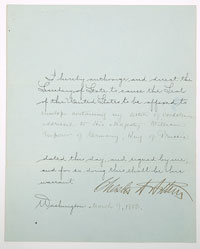 |
Arthur, Chester A. Partly-printed Document Signed "Chester A Arthur" as President, one page, 10 x 8 in., Washington, March 7, 1883. The document, which is accomplished in manuscript, orders the Secretary of State to affix the Seal of the United States to an "envelope containing my letter of condolence addressed to His Majesty William Emperor of Germany, King of Prussia…." On January 21, 1883, Prince Frederick Charles Alexander of Prussia, the 81-year-old-brother of Wilhelm. had died. His last words were, "Long live the Emperor."
Wilhelm I (1797-1888), was emperor of Germany (1871-88) and king of Prussia (1861-88). He became regent in 1858 when his brother, King Frederick Wilhelm IV was declared insane, and king of Prussia upon his brother's death. With Otto von Bismarck as his chancellor, Wilhelm oversaw the unification of Germany and its emergence as a European power. After the Franco-Prussian War of 1870-71, he received the surrender of Napoleon III at Sedan and was proclaimed emperor of Germany in the Hall of Mirrors at Versailles on January 18, 1871.
Estimated Value $1,000 - 1,250.
View details and enlarged photo
| Unsold |
Lot 315 |
 |
Arthur, Chester A (1830-1886) 21st president of the United States (1881-85); he succeeded to the presidency after Garfield's assassination. Check Signed "C.A. Arthur," and executed by him, New York, June 22, 1875. Written on The Nassau Bank and paid to the order of George Hillier for $200.00. Stamp cancellation does not touch Arthur's large signature. Fine.
Estimated Value $500 - 600.
View details and enlarged photo
| Unsold |
Lot 316 |
 |
Buchanan, James (1791-1868) 15th President of the United States (1857-1861). Autograph Letter Signed "James Buchanan" as U.S .Senator, one page, 10 x 8 in., Washington, Feb. 21, 1836. Both horizontal folds almost completely separated and needing repair but not affecting the beautifully-penned text or signature. In 1832 President Andrew Jackson stated that the Bank of the United States was essentially a monopoly and he vetoed its re-charter, scheduled for 1836. When the old charter expired in 1836, the Bank obtained a State Charter in Pennsylvania. In this letter, Buchanan expresses his concern to Samuel Dale about the fate of his state once the State Charter becomes official. In part: "We have all been astounded here at the progress & passage of the Bank Bill through our Senate. The President feels deeply upon the subject. Indeed several persons here who were friendly to the Bank as a United States Institution condemn it loudly as a state measure. If it was dangerous formerly to the whole country as I sincerely believe, what will be our condition in Pennsylvania where all its energies shall be concentrated upon one single state."
During the years between Jackson's veto and the expiration of the charter (1832-36), Jackson had hastened the demise of the Bank by withdrawing approximately $11 million in federal funds on deposit and distributing it to various state banks. In an effort to use these funds, the various state banks extended easy credit and issued paper money freely, which touched off western real estate land speculation and inflation. To stop this, Jackson required buyers of public lands to pay only in gold or silver. This led to a run on the banks to turn in their paper money for gold and silver. The banks did not have enough gold and silver and almost half of all banks failed and closed permanently. This was the beginning of the Panic of 1837 and a depression which lasted five years. The Bank of the United States also went bankrupt in 1841.
Estimated Value $3,000 - 4,000.
View details and enlarged photo
| Realized
$3,760 |
Lot 317 |
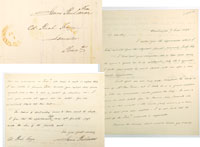 |
Buchanan, James. Autograph Letter Signed "James Buchanan" as U.S. Senator, 2 pages, Washington, June 7, 1842. With Free Franked holograph address leaf. To Col. Reah Frazer in Lancaster, Pa., expressing his opposition to bringing back Martin Van Buren as the Democrats' presidential nominee in 1844. In part: "Great efforts are now being made throughout the Country in favor of Mr. Van Buren; but I think it is a general impression here that his nomination would jeopard the party. In order to succeed we must detach from the Harrison party Democrats who left us on that occasion & who would gladly return, if a new man & new issues were adopted. I do not think that the prospect for the Penna. candidate is unfavorable…." Very fine.
President William Henry Harrison had been the first Whig to gain the presidency. When he died after only a month in office, and John Tyler, his Vice President, took over, the Democrats started a movement to bring back Martin Van Buren in an effort to regain the office of the presidency, which they had held since 1829. Here James Buchanan advises against such a movement, and when the Democrats convened in Baltimore in May 1944, Buchanan was one of those who eroded support for Van Buren, resulting in the nomination of dark-horse candidate James K. Polk. When Polk was elected, he appointed Buchanan his Secretary of State.
Estimated Value $2,000 - 2,500.
View details and enlarged photo
| Unsold |
Lot 318 |
 |
Buchanan, James. Partly-printed Document Signed "James Buchanan" as President, one page, 10½ x 8 in., Washington, Mar. 19, 1857. Accomplished in manuscript. Ordering the Secretary of State to affix the Seal of the United States to "my ratification of the Treaty and separate Articles between the United States and Great Britain, relative to Central America, concluded and signed at London on the 17th of October last…." Large, bold signature. Lightly toned and a few edge chips, else fine.
Because of the possibility of an inter-oceanic canal across Nicaragua, both the United States and Great Britain were wary of each other's presence in Central America. Great Britain had territorial claims in Belize (or British Honduras), the Mosquito Coast, and the Bay Islands. The United States had no territorial claims, but had treaties ready for ratification with Nicaragua and Honduras. The Clayton-Bulwer Treaty was negotiated in 1850 to ensure that neither country obtained exclusive control of the proposed canal. The treaty was signed and ratified by both governments, but before the exchange of ratifications, the British made a declaration that the treaty did not apply "to Her Majesty's settlement at Honduras [Belize] or its dependencies." The U.S. then followed with a counter declaration, and negotiations went on until a treaty was signed on Oct. 17, 1856, which supposedly removed the difficulties.
As one of his first acts in office, President Buchanan orders, by the present document, that the Seal be affixed to his ratification of the Treaty. But wait! This is still not the end. Other propositions and counter-propositions regarding the sovereignty of Honduras (Belize) follow, all of which are rejected. As President Buchanan notes on December 8, 1857, in his first State of the Union message to Congress, "…it has been our misfortune almost always to have had some irritating, if not dangerous, outstanding question with Great Britain. Since the origin of the Government we have been employed in negotiating treaties with that power, and afterwards in discussing their true intent and meaning. In this respect…the Clayton and Bulwer treaty has been the most unfortunate of all…." He affirms that, nevertheless, he will "not refuse to contribute to any reasonable adjustment of the Central American questions which is not practically inconsistent with the American interpretation of the treaty…."
Estimated Value $1,500 - 2,000.
View details and enlarged photo
| Realized
$2,350 |
Lot 319 |
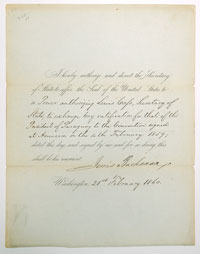 |
Buchanan, James. Partly-printed Document Signed "James Buchanan" as President, one page, 10½ x 8 in., Washington, Feb. 21, 1860. Accomplished in manuscript. Ordering the Secretary of State to affix the Seal of the United States to "a Power authorizing Lewis Cass, Secretary of State, to exchange my ratification for that of the President of Paraguay to the Convention signed at Asuncion on the 4th February 1859…." A horizontal fold runs lightly through the large, bold signature, else fine.
In February 1855, the U.S.S. Water Witch had been fired upon by Paraguayan forces when it sailed without authorization into Paraguay's waters. The pilot on the American ship was killed in the incident, and relations between the two nations were thereafter very strained. In 1858, Buchanan sent James B. Bowlin, a former Missouri congressmanan, with a Naval squadron to demand redress from Paraguay. After two weeks of negotiations with Paraguayan dictator Carlos Antonio López, the dispute was resolved peacefully. The family of the slain Water Witch crewman was indemnified, and the United States received an apology and an advantageous commercial treaty with Paraguay. Gunboat diplomacy at work!
Estimated Value $1,200 - 1,500.
View details and enlarged photo
| Unsold |
Lot 320 |
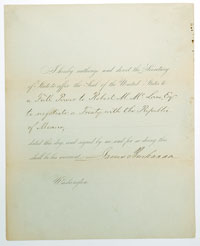 |
Buchanan, James. Partly-printed Document Signed "James Buchanan" as President, one page, 10 x 8 in., Washington, n.d. but 1859. Accomplished in manuscript. Ordering the Secretary of State to affix the Seal of the United States to "a Full Power to Robert M. McLane, Esqr. to negotiate a Treaty with the Republic of Mexico…." Large, bold signature. Lightly toned, else fine.
Former congressman and U.S. Commissioner to China, Robert M. McLane was named U.S. Minister to Mexico by President Buchanan on March 7, 1859, during a period of revolutionary turmoil in Mexico. McLane was instructed to recognize the government of Benito Juarez, then at Vera Cruz, which he did in April.
On December 14, 1859, McLane signed the McLane-Ocampo Treaty, formally the Treaty of Transit and Commerce, by which Mexico would sell the perpetual right of transit to the Isthmus of Tehuantepec to the U.S. for $4 million, only $2 million of which was to be paid immediately (the remainder to be held in the U.S. for payment to American citizens suing the Mexican government for damages). All transit would be free and Mexican troops would aid in the enforcement of the rights granted the U.S. President Juarez was willing to sign because he needed money to finance his war against the Conservative Party. President Buchanan favored the treaty but in May 1860, the U.S. Senate rejected the treaty and the convention. Because of the impending Civil War at home, McLane did not return to Mexico.
Estimated Value $1,200 - 1,500.
View details and enlarged photo
| Unsold |
Lot 321 |
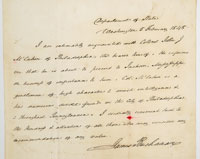 |
Buchanan, James. Autograph Letter Signed "James Buchanan" as Secretary of State, one page, 10 x 8 in., Washington, February 5, 1848. Being a letter of introduction for Colonel John J. McCahen. Buchanan writes, in full: "I am intimately acquainted with Colonel John J. McCahen of Philadelphia, the bearer hereof. He informs me that he is about to proceed to Jackson, Mississippi, on business of importance to him. Col. McCahen is a gentleman of high character & much intelligence & has numerous devoted friends in the City of Philadelphia & throughout Pennsylvania. I cordially commend him to the kindness & attention of all those who may consider my recommendation of any value." Fine; a small red stain has bled from the verso of the integral blank, leaving a small spot on the recto, which does not affect the text. Boldly penned and signed.
Estimated Value $1,000 - 1,500.
View details and enlarged photo
| Unsold |
Lot 322 |
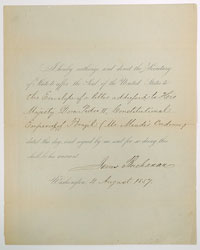 |
Buchanan, James. Partly-printed Document Signed "James Buchanan" as President, one page, 10 x 8 in., Washington, Aug. 4, 1857. Accomplished in manuscript. Ordering the Secretary of State to affix the Seal of the United States to "the Envelope of a letter addressed to His Majesty Dom Pedro II, Constitutional Emperor of Brazil (Mr. Meade's Credence)…." Large, bold signature. Light toning, else fine.
Richard Kidder Meade (1803-1862) was a congressman from Virginia when President Buchanan appointed him minister to Brazil. He served until 1861, when the American Civil War broke out. He returned to the United States and devoted himself to the Confederacy for the last year of his life.
Brazil was ruled by Dom Pedro II (1825-1891), the second and last emperor of Brazil. Dom Pedro was liberal in outlook, a champion of the arts and sciences, and a friend of renowned scholars, poets, and musicians. He ruled from 1841-1889 and was popular with his people but was ousted by a military coup in 1889. He had long pushed for the abolition of slavery, but it was not until 1888 that it was signed into law, making Brazil the last country to formally abolish slavery.
Estimated Value $800 - 1,000.
View details and enlarged photo
| Unsold |
Lot 323 |
 |
Bush, George H.W. and Bill Clinton. Color Photograph Signed "Bill Clinton" and George Bush" and inscribed in another hand to "Adrienne Colemann / Best wishes," 9½ x 7½ in., n.d. The three Presidents are dressed for golf. The photo is housed in an 11½ x 9½ in. standing frame. Very fine. Adrienne Coleman is a former Secret Service agent.
Estimated Value $300 - 500.
View details and enlarged photo
| Unsold |
Lot 324 |
 |
[Bush, George W. and Laura]. Three hand-painted Christmas ornaments presented by President and Mrs. Bush in 2004, 2006, and 2008 to staff and friends. Each ornament is dated, numbered and signed by the artist and is in its original box which has an image of the White House on the cover and a Certificate of Authenticity laid into the inside of the cover. The 2004 (edition of 925) and 2006 (edition of 1,000) ornaments were designed and hand-painted by American folk artist Seton McGlennon. The 2008 ornament (edition of 1,000) was designed and hand-painted by Barbara Franzreb. All in excellent condition.
Estimated Value $400 - 600.
View details and enlarged photo
| Unsold |
Lot 325 |
 |
Carter, Jimmy. Black and white Photo Signed "J Carter," 8 x 10 in.,n.p., n.d. Picturing President Carter with Egyptian President Anwar Sadat and Israeli Prime Minister Menachem Begin at the time of the Sinai Accords. Carter signed boldly with a black marker in the lower border. Fine.
Estimated Value $150 - 200.
View details and enlarged photo
| Realized
$88 |
Lot 326 |
 |
Carter, Jimmy and Bill Clinton signed book. The Democratic Party - A Photographic History by Dr. Peter J. Ling. Large bold signatures of both in white Sharpie pen on inside front page. With dust jacket and in superb condition. JSA LOA.
Estimated Value $100 - 150.
View details and enlarged photo
| Realized
$259 |
Lot 327 |
 |
Carter, Jimmy. Signed book. The Blood of Abraham, Insights into the Middle East. Signed on the book plate on front end page. With dust jacket, very fine condition. JSA LOA.
Estimated Value $50 - 75.
Deaccessioned from The Altoona Public Library, Altoona, WI.
View details and enlarged photo
| Realized
$82 |
Lot 328 |
 |
Cleveland, Grover. Autograph Manuscript Signed "Grover Cleveland," 2½ pages, 10 x 7¾ in., n.p., n.d. These pages are part of a speech on patriotism and holiday observance that Cleveland gave to the Union League Club of Chicago in 1907 on Washington's birthday, February 22. In this speech, the ex-President gives a lesson in civics and defines good citizenship.
In part: "I indulge in no mere figure of speech when I say that our Nation--the immortal spirits of our domain--lives in us, in our hearts, and minds, and consciences. There it must find its nutriment or die. This strength more than any other, presents to our minds the impression of and responsibility of American Citizenship. The land we live in seems to be strong and active. But how fares it with the land that lives in us? Are we sure that we are doing all we ought, to keep it in vigor and health? Are we keeping its roots well surrounded by the fertile soil of living allegiance, and are we furnishing them the invigorating moisture of unselfish fidelity. Are we as diligent as we ought to be to protect this precious growth against the poison that must arise from the doing of harmony, and honesty, and industry and frugality; and are we sufficiently watchful against the deadly…pests of consuming greed and cankerous cupidity? Our answers to these questions make up the account of our stewardship as keeps of a sacred trust. The land we live in is safe so long as we are dutifully careful of the land that lives in us….If we would bestow…the care it needs, it is indispensable that we should recognize the weakness of our human nature, and our susceptibility to temptations and influences that interfere with a full conception of our obligations….there is in my mind a sober conviction that we all can and ought, to do more for the Country that lives in us, than it has been our habit to do; and that no better means to this end are at hand than a revival of pure, patriotic affection for our Country for its own sake, and the acceptance…of the virtues which Washington regarded as all that was necessary to make us a great and happy people, and which he declared to be 'the great and essential pillars of public felicity'--harmony, honesty, industry, and frugality."
Boldly penned and signed in black ink. Minor soiling and some light dampstaining, not affecting legibility of the text and not touching the signature.
Estimated Value $6,000 - 8,000.
View details and enlarged photo
| Unsold |
Lot 329 |
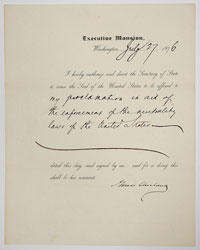 |
Cleveland, Grover. Partly-printed Document Signed "Grover Cleveland" as President, one page, 10 x 8 in., Executive Mansion, Washington, July 27, 1896. Ordering the Secretary of State to "cause the Seal of the United States to be affixed to my proclamation in aid of the enforcement of the neutrality laws of the United States…."
Here is the text of the proclamation to which the Seal was affixed on July 27, 1896:
"Whereas by a proclamation dated the 12th day of June, A.D. 1895, attention was called to the serious civil disturbances, accompanied by armed resistance to the established Government of Spain, then prevailing in the island of Cuba, and citizens of the United States and all other persons were admonished to abstain from taking part in such disturbances in contravention of the neutrality laws of the United States; and Whereas said civil disturbances and armed resistance to the authority of Spain, a power with which the United States are on terms of peace and amity, continue to prevail in said island of Cuba; and
Whereas since the date of said proclamation said neutrality laws of the United States have been the subject of authoritative exposition by the judicial tribunal of last resort, and it has thus been declared that any combination of persons organized in the United States for the purpose of proceeding to and making war upon a foreign country with which the United States are at peace, and provided with arms to be used for such purpose, constitutes a "military expedition or enterprise" within the meaning of said neutrality laws, and that the providing or preparing of the means for such "military expedition or enterprise," which is expressly prohibited by said laws, includes furnishing or aiding in transportation for such "military expedition or enterprise;" and
Whereas, by express enactment, if two or more persons conspire to commit an offense against the United States any act of one conspirator to effect the object of such conspiracy renders all the conspirators liable to fine and imprisonment; and
Whereas there is reason to believe that citizens of the United States and others within their jurisdiction fail to apprehend the meaning and operation of the neutrality laws of the United States as authoritatively interpreted as aforesaid, and may be misled into participation in transactions which are violations of said laws and will render them liable to the severe penalties provided for such violations:
Now, therefore, that the laws above referred to, as judicially construed, may be duly executed, that the international obligations of the United States may be fully satisfied, and that their citizens and all others within their jurisdiction, being seasonably apprised of their legal duty in the premises, may abstain from disobedience to the laws of the United States and thereby escape the forfeitures and penalties legally consequent thereon, I, Grover Cleveland, President of the United States, do hereby solemnly warn all citizens of the United States and all others within their jurisdiction against violations of the said laws, interpreted as hereinbefore explained, and give notice that all such violations will be vigorously prosecuted; and I do hereby invoke the cooperation of all good citizens in the enforcement of said laws and in the detection and apprehension of any offenders against the same, and do hereby enjoin upon all the executive officers of the United States the utmost diligence in preventing, prosecuting, and punishing any infractions thereof.
Done at the city of Washington, this 27th day of July, A. D. 1896, and of the Independence of the United States the one hundred and twenty-first. GROVER CLEVELAND.
For close to half a century, Americans had sympathized with, and even died while participating in Cuban attempts at independence from Spain. Because of Cuba's closeness to Central America and the canal which was projected to be built there, as well as American business interests in Cuba, the U.S. government closely watched events there. When the Spanish military commander, Valeriano Weyler y Nicolau, herded some 500,000 people into concentration camps, horrific stories of their abuse reached the U.S.; "yellow journalism," practiced by William Randolph Hearst's New York Journal and Joseph Pulitzer's New York World, further inflamed the public. In this atmosphere, Cleveland issued his proclamation of neutrality. It would barely hold until early 1898, when the U.S. battleship Maine was sunk in Havana harbor, and the Spanish American war began.
Estimated Value $6,000 - 8,000.
View details and enlarged photo
| Unsold |
Lot 330 |
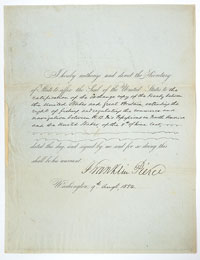 |
Pierce, Franklin. Partly-printed Document Signed "Franklin Pierce" as President, one page, 10½ x 8 in., Executive Mansion, Washington, July 27, 1896. Ordering the Secretary of State to "cause the Seal of the United States to be affixed to the ratification of the exchange copy of the treaty between the United States and Great Britain, extending the right of fishing, and regulating the commerce and navigation between H[er] B[ritannic] M[ajesty]'s Possessions in North America and the United States, of the 5th of June last…." Small mounting remnant at left edge, affecting nothing, else fine. Pierce's large, bold signature is in black ink.
Until 1846, Great Britain protected its economy and that of its empire, including Canada, with a system of preferential tariff rights; that year, however, Great Britain abrogated the Corn Laws which gave Canadian agricultural producers advantageous customs duties. The economic situation in Canada was bleak so Canada turned to the United States.for new export opportunities. Lord Elgin, who was governor general of Canada, attempted to interest Washington in a reciprocity treaty, but the U.S. saw no advantages in such a treaty until American fishermen were offered fishing rights to Atlantic fisheries north of the thirty-sixth parallel and most Canadian produce and raw materials were listed as goods reciprocally duty-free.A ten-year treaty was signed in 1854, renewable annually.The U.S. did not renew the treaty in 1866, largely because of pressure from America's protectionist circles. A primary reason for the creation of the Canadian Confederation in 1867 was the need to find new markets to sell products from British colonies.
Estimated Value $4,000 - 6,000.
View details and enlarged photo
| Unsold |
Lot 331 |
 |
Cleveland, Grover. Autograph Letter Signed "Grover Cleveland" as Governor of New York, on Executive Chamber stationery, 1½ pages, 7¾ x 4¾ in. To an unidentified general ("My dear General"), regarding the Red Cross. In part, "…The American Association of the Red Cross has for its object, as I understand it, the alleviation of human suffering. I very cheerfully give my support and encouragement to such an undertaking. I am much gratified by the invitation to be your guest on Evacuation day…" Fine; one mounting strip on verso of one edge of the integral leaf, affecting nothing. The American Red Cross was a fledgling organization when Cleveland wrote this letter; it was founded by Clara Barton in 1881 in Washington, D.C.
Estimated Value $3,000 - 5,000.
View details and enlarged photo
| Unsold |
Lot 332 |
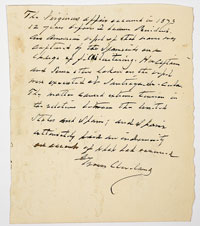 |
Cleveland, Grover. Autograph Manuscript Signed "Grover Cleveland" as President, one page, 5¾ x 4¾ in., n.p., n.d. As American public opinion grows angrier at reports of Spanish atrocities, President Cleveland starts to rethink the Neutrality Proclamation which he signed on June 12, 1895, and which refused to show any preference to the insurgents who were attempting to free Cuba from Spain. Here he writes an account of the Virginius affair, which had aroused the ire of the American public some years earlier: "The Virgin[i]us affair occurred in 1873 12 years before I became President. An American vessel of that name was captured by the Spaniards on a charge of fillibustering. Her captain and some others taken on the vessel were executed at Santiago de Cuba. The matter caused extreme tension in the relations between the United States and Spain; and Spain ultimately paid an indemnity on account of what had occurred." Light toning and soiling; several contemporary ink smears.
The Virginius was a former Civil War era blockade runner side-wheel steamer. It was captured off Morant Bay, Jamaica, by the Spanish vessel Tornado, and taken to Santiago de Cuba. where 53 people--crew members and passengers--were summarily court martialed on the charge of filibusterng (actively supporting the Cuban insurrectionists against Spain) and executed as pirates.
Earlier attempts at filibustering had been made, including one by Narcisco Lopez in 1850 and again in 1851, assisted by Southerners who hoped Cuba would join the Union as a slave state. The second attempt resulted in Lopez' execution, as well as that of Col. William Crittenden and many other Americans.
Estimated Value $3,000 - 5,000.
View details and enlarged photo
| Unsold |
Lot 333 |
 |
Cleveland, Grover (1837-1008) 22nd and 24th President of the United States (1885-89, 1893-97). Autograph Letter Signed "Grover Cleveland," on Bangs Stetson Tracy & MacVeach letterhead, 2 pages, 10¼ x 8 in., New York, June 26, 1889. To Mr Perry, regretting that he cannot participate in the Fourth of July celebration at Woodbury and ruminating on how that day, "the day on which a nation of brave and independent freemen was born," should be celebrated. In part, "It seems to me that the condition of American patriotism and our national pride in all we are and all that we hold meaningful may be measured by the zeal and order with which the Fourth of July is celebrated…." The ink is somewhat light and outer edges are light from previous framing; otherwise, fine.
Estimated Value $1,000 - 1,200.
View details and enlarged photo
| Unsold |
Lot 334 |
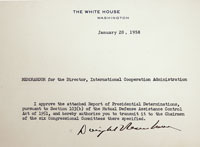 |
Eisenhower, Dwight D (1890-1961) 34th President of the United States (1953-1961); Supreme Commander of Allied Forces in World War II. Typed Document Signed "Dwight D. Eisenhower" as President, on The White House letterhead, one page, 10½ x 8 in., Washington, Jan. 20, 1958. Being a "Memorandum for the Director, International Cooperation Administration," approving a "Report of Presidential Determinations, pursuant to Section 103(b) of the Mutual Defense Assistance Control Act of 1951…." Very fine.
Estimated Value $500 - 700.
View details and enlarged photo
| Unsold |
Lot 335 |
 |
Eisenhower, Dwight D. & Mamie Doud Eisenhower. Photograph Signed as President and First Lady, 13 x 9¼ in., n.p., n.d. (1954). The First Couple stand on the ramp of Air Force One (Columbine) on August 21, 1954, on their way to Denver, Colorado. The printed inscription says, "For Sergeant Wayman I. McGarrh with appreciation of fine services at the White House and with best wishes for the future." The Columbine departed from Andrews Air Base in Washington, D.C. Photo by Abbie Rowe of the National Park Service. Fine except for a couple of minor creases at bottom and some ink skips in Mamie's signature. Handsomely matted and framed to an overall size of 19½ x 15¾ in. An uncommonly large and attractive photo of Ike and Mamie. With a dinner plate from the Columbine, engraved "D.D.E." under a floral spray on the front and on the back: "The Presidential Plane / Columbine / Washington, D.C. / May 1956 / Shenango China." Very fine.
Estimated Value $1,200 - 1,500.
View details and enlarged photo
| Unsold |
Lot 336 |
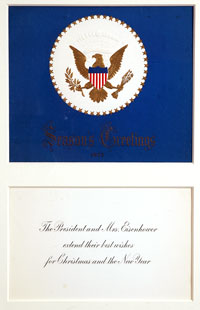 |
[Eisenhower, Dwight D. and Mamie]. Official 1955 Christmas card engraved "Seasons Greetings 1955" in gold against a blue background, below a patriotic gold eagle bearing a red, white, and blue shield and in black against a cream background below: "The President and Mrs. Eisenhower extend their best wishes for Christmas and the New Year." Matted and framed to an overall size of 15¾ x 12 in.
Estimated Value $400 - 600.
View details and enlarged photo
| Unsold |
Lot 337 |
 |
Fillmore, Millard (1800-1874) 13th President of the United States (1850-53). Partly-printed Document Signed "Millard Fillmore" as President, one page, 10½ x 8 in., Washington, Feb. 16, 1852. Accomplished in manuscript. Ordering the Secretary of State to affix the Seal of the United States to "the envelope of a letter addressed to the President of France, in answer to one just received from His Excellency, relative to the causes which induced him to adopt measures to change the form of Government in that country…." Fine; tone lines from a previous framing and small tape repairs on verso of right edge, none of which affects the text or signature.
Louis-Napoléon Bonaparte (1808-1873) was the nephew and heir of Napoleon I. After spending his youth in exile, he was elected president of the French Second Republic (1848-52). By means of a coup, he, ascended the throne as Napoleon III on Dec. 2, 1852. He ruled until 1870 when the French lost the Franco-Prussian War. He was both the first titular president and the last monarch of France.
The revolution of 1848 swept away the government of King Louis-Philippe, but was unable to remove the conservative and monarchist interests that had supported it. These groups opposed the idea of a republican government and tried to avoid it by electing as president Louis Napoleon, whom they thought they could control. When he came to power, however, the moderate (and sometimes liberal) Louis Napoleon found himself at odds with the conservatives who remained in control of the assembly. As president of the Second Republic, he was limited by law to one term, and the conservatives intended to wait out his term and replace him with one of their own men. Louis Napoleon proposed a constitutional amendment that would allow the president to serve for more than one term, and when this was defeated in the assembly in July 1851. he staged a coup on the anniversary of his uncle's victory at the Battle of Austerlitz.
The legislative assembly was dissolved and the conservatives neutralized, universal suffrage was reestablished and a plebiscite authorizing the revision of the constitution was announced. An attempted radical uprising was repressed and steps were taken to assure a majority in the plebiscite. Victory would, in any event, have been the probable outcome, as the Bonaparte name promised glory, order, and a possible solution to France's political division. The plebiscite was held on December 22 and 23, 1851, and approval of Louis Napoleon was overwhelming.
A new constitution was enacted on January 14, 1852, which gave Louis Napoleon dictatorial powers and created a council of state, a senate, and a legislative assembly subservient to him. Subsequent decrees barred republicans from the ballot and throttled the press. It was clear that Louis Napoleon had become, in essence, an elected monarch. All of this was watched with some trepidation in the United States, which always hoped to see France a republic, and by President Fillmore in particular; the French president was arbitrating a financial dispute between the U.S. and Portugal, and the American people would prefer a decision from a republican leader, rather than a monarch. The situation in France soon received President Fillmore's personal attention, and the New York Times reported on February 12, 1852, that he had "received an autograph letter from Louis Napoleon expressing a desire to cultivate friendly relations with the United States." President Fillmore was quick to respond, sending his reply only four days later.
Estimated Value $8,000 - 12,000.
View details and enlarged photo
| Unsold |
Lot 338 |
 |
Fillmore, Millard. Partly-printed Document Signed "Millard Fillmore" as President, one page, 9¾ x 8 in., Washington, Mar. 11, 1851. Accomplished in manuscript. Ordering the Secretary of State to affix the Seal of the United States to "the Ratification and ratified copy of the Convention with the Mexican Republic for the protection of a transit way across the Isthmus of Tehuantepec…." Fine; a light horizontal fold traverses the top of the "M" and "F" in the signature.
In 1842 Antonio López de Santa-Anna had given José de Garay the concession for a road, railway, or canal across the Isthmus of Tehuantepec. Gaetano Moro surveyed the area and proposed a canal of 161 locks, but lack of funds and the Mexican-American war prevented any progress on the project. The Treaty of Guadalupe Hidalgo ended the war in 1848 and U.S. negotiator Nicholas Trist attempted, with no luck, to win transit rights across the Isthmus of Tehuantepec by paying Mexico an additional $15 million. In 1850, the two countries came to a tentative agreement guaranteeing transit across the isthmus. but a sticking point was reached when the Americans wanted to have the right to intervene militarily of their own accord and not just at the behest of the Mexican government. This created antagonism and fear that the U.S. might try to annex more territory; the Mexican Senate refused to ratify the treaty and in 1851, declared the Garay concession null and void. Eventually, in 1853, with the signing of the Gadsden Treaty, the U.S. gained not only a half million square miles of territory, but also rights of transit over the Isthmus of Tehuantepec.
Estimated Value $3,000 - 5,000.
View details and enlarged photo
| Unsold |
Lot 339 |
 |
Fillmore, Millard. Autograph Letter Signed "Millard Fillmore" as a member of the House of Representatives, one page, 9 x 7½ in., Buffalo, Oct. 28, 1837. Amidst the financial crisis of the Panic of 1837, Fillmore writes to D. E. Evans, "Enclosed I send you the receipts which I took at the Globe and the National Intelligence offices for your papers." Very fine; a couple of creases affect nothing. Boldly penned and signed.
It is interesting that Fillmore took the time to pay for a subscription to two newspapers for an associate, and that he reports on this payment by sending a personal letter written in his own handwriting. David E. Evans was the accounting clerk of the Holland Land Company; in 1827, he became the local agent for the company and was known for his humane management of the company's business. The town of Evans, New York is named for him. It is located south of Buffalo and borders Lake Erie.
Estimated Value $700 - 900.
View details and enlarged photo
| Realized
$793 |
Lot 340 |
 |
Ford, Gerald R (1913-2006) 34th President of the United States (1974-1977). Book Signed and Inscribed To Ron, Gerald R. Ford Member Warren Commission in blue ink on the front end page. Report of the Warren Commission - The Assassination of President Kennedy. The New York Times Edition. Very Fine condiiton. JSA LOA.
Estimated Value $75 - 100.
View details and enlarged photo
| Realized
$76 |
Lot 341 |
 |
Garfield, James A (1831-1881) 20th President of the United States (1881); assassinated by Charles Guiteau. Holograph envelope addressed by Garfield as a Member of Congress to Secretary of War E.M. Stanton and Free Franked by Garfield, "J.A. Garfield / MC." At lower left Garfield wrote, "Introducing Col. J.W. Burke." Garfield was first elected to Congress in 1862 while serving in the Union Army; he resigned his commission to take his seat and served through 1878.
Estimated Value $300 - 400.
View details and enlarged photo
| Realized
$235 |
Lot 342 |
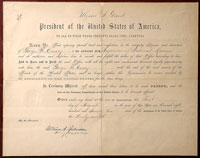 |
Grant, Ulysses S (1822-1885) 18th President of the United States (1869-77). Document signed as President, 1p, 13 x 16½", Washington, Aug. 1, 1872. Appointing George W. Emery Supervisor of Internal Revenue. Countersigned by William A. Richardson as Acting Secretary of the Treasury. Grant's signature has faded to the point of being almost invisible, otherwise fine except for a couple of small fold holes. Matted with a portrait of Grant and framed to an overall size of 20¾ x 33¾".
Estimated Value $200 - 300.
View details and enlarged photo
| Unsold |
Lot 343 |
 |
Harding, Warren G (1865-1923) 29th President of the United States. A mysterious Autograph Letter Signed "W G Harding," one page, 9¼ x 8 in., n.p., n.d. Being a pencil draft of a night letter ("NL") is at upper right) to Charles E. Sawyer, his personal physician and, later, Surgeon General. In full: "Talked with Pillsbury today and he talked encouragingly. Authorities here not available to him up to noon today. He is to ask my assistance if he fails to secure relief. Said S------ attitude would not delay matters. Seemed to be helping us." Tan paper has file holes at top and one old staple, else fine.
Estimated Value $700 - 900.
View details and enlarged photo
| Unsold |
Lot 344 |
 |
Harrison, Benjamin (1833-1901) 23rd President of the United States (1889-93). Manuscript Letter Signed "Benj Harrison," on letterhead engraved 674 North Delaware Street, one page, 6¼ x 4 in., Indianapolis, June 21, 1897. To Alfred Curtin Hirst of Philadelphia, thanking him for "the copy of the memorial hymn on the death of General William Henry Harrison. I shall be glad to place it with other papers relating to him." Very good; some overall soiling and one tape repair on verso at horizontal fold. Benjamin Harrison, the 23rd President, was grandson to William Henry Harrison, the 9th President.
Estimated Value $800 - 1,000.
View details and enlarged photo
| Realized
$470 |
Lot 345 |
 |
Harrison, William Henry (1773-1841) 9th President of the United States (1841). Autograph Letter Signed "W.H. Harrison," one page, 8¾ x 7¾ in., Cincinnati, July 16, 1833. Addressed, "My dear sir," the letter reads, in part: "I delayed sending my wool to you to forward to Phil[adelphia] in consequence of my meeting with Mr. Walker (of the house of Clifton & Walker) who told me that he was authorized to purchase the article for a friend & that he would pay the cash for it. I sent up the sample & it is only a few days ago that he informed me that his friend would take the two…parcels only for himself …. I missed sending it up in a keel boat last week & will certainly send it to you in all this week…I am in a strait for $300 which I want you to advance on this wool. You must not refuse for really I must have it…." Good condition; moderately toned; tiny areas of paper loss at margins affecting a couple of letters, several partial fold splits, and scattered light stains. Boldly penned and signed.
Written while Harrison was devoting most of his energies to running his farm in North Bend and attempting to repair his financial position, damaged by his having assumed responsibility for the unpaid debts of his sons William and Symmes and of Cincinnati friends. Harrison had returned three years earlier from Bogota, Columbia, where he had served as Minister Plenipotentiary, an appointment he had sought largely for financial reasons. Soon after arriving, however, President Jackson had him recalled. This letter was written in the quiet turmoil before the Presidential storm that would catapult him into office three years later.
Estimated Value $2,500 - 3,500.
View details and enlarged photo
| Realized
$1,469 |
Lot 346 |
 |
Hoover, Herbert (1874-1964) 31st President of the United States ((1929-1933). Typed Letter Signed "Herbert Hoover" in blue ink on personal letterhead, one page, 10½ x 7¼ in., Stanford University, California, Aug. 4, 1928. To Walter F. Brown in the Department of Commerce regarding the address which Hoover would give one week later accepting the Republican nomination for President. In part: "…I found myself a good deal troubled about the paragraph on the colored people. I had written the speech with the very deliberate attempt to cover all groups equally in every particular. I felt that it was undesirable to pick out any particular racial group - that it was more in their own interest to treat them as Americans…." An advance copy of the Address of Acceptance is included. In it, Hoover notes that "Equality of opportunity is the right of every American--rich or poor, foreign or native-born, irrespective of faith or color…." One paper clip mark at top edge, else fine.
Estimated Value $600 - 800.
View details and enlarged photo
| Realized
$360 |
Lot 347 |
 |
[Jackson, Andrew]. Miniature Watercolor on Ivory Signed "H.Strong" at center left, 3¾ x 2½ inches. Antique frame is 5 3/8 x 4 inches; written on verso is, "Andrew Jackson, Prest. U.S.A., Hero of New Orleans, painted on Ivory by H. Strong." Very fine.
Howard Strong (1800-1850) was a mid-19th century artist from Illinois, best known for his portraiture. His portrait of Andrew Jackson is based on the work by James Barton Longacre, dated 1829. Longacre's portrait of Jackson first appeared in The National Portrait Gallery of Distinguished Americans (1834-1839), which he worked on with fellow artist James Herring, and which is Longacre's most well known work. The original watercolor of Andrew Jackson is now in the collection of the National Portrait Gallery in Washington D.C. Other notable contributions of Longacre can be found in his portrait engravings in Sanderson's Biography of the Signers of the Declaration of Independence (1820). Reference: Barber, James G. Andrew Jackson: A Portrait Study. Pp. 106-109.
Estimated Value $9,000 - 12,000.
View details and enlarged photo
| Unsold |
Lot 348 |
 |
Jefferson, Thomas (1801-1809) Third President of the United States; author of the Declaration of Independence. Autograph Letter Signed in the text, one page, Monticello, Feb. 20 (18)17. To Dr. Samuel Mitchell: "Th: Jefferson returns his thanks to Dr. Mitchell for the print of Asiatic antiquities he has been so kind as to send him, which, however unitelligible to him, is still a curiosity. he is happy in the occasion it has prescribed of a mutual recognition of former fellowship in service, and of renewing to him the assurance of his constant esteem & respect."
Dr. Mitchell, who was a physician, a United States Senator, a scientist, and a Quaker, had written to Jefferson on February 10, 1817, transmitting a print of ancient cuneiform bricks (the earliest form of manuscript communication), which had lately been brought to New York. In the same letter, Mitchell suggested a commission for settling boundaries with Great Britain. In 1788 he had been appointed one of the Commissioners to negotiate with the six nations for the purchase of lands in western New York. In 1792 he was appointed to the Chair of Natural History at Columbia College. He also helped to found the New York Literary and Philosophical Society and in 1817 was the principal founder of the Lyceum of Natural History, the forerunner of the New York Academy of Science.
Accompanied by the letter's original Free Frank. The address leaf is signed, "free Th: Jefferson" and addressed in Jefferson's hand to "The honble Doctor Mitchell of Congress now at Washington." The last five words were marked through and another hand redirected the letter to New York. Very fine condition; normal folds toned on address leaf; seal tear affects nothing.
Estimated Value $20,000 - 30,000.
View details and enlarged photo
| Realized
$18,400 |
Lot 349 |
 |
Kennedy, John F (1917-1963) 35th President of the United States.(1961-63); assassinated. Signature obtained three days before JFK became President-elect, 2¾ x 3¾ in. (Beverly Hills, California, Nov. 2, 1960). On that date, he gave an address at the Beverly Hilton Hotel on "Education: Criticism of the Republican Party." The late Marlene Mancher, who was 20 years old at the time, came to see candidate Kennedy and when she came face-to-face with him after the address, she quickly tore a check in half and ask him to sign the back. She kept the signature for the rest of her life.
Estimated Value $500 - 600.
View details and enlarged photo
| Unsold |
Lot 350 |
 |
Withdrawn
View details and enlarged photo
| Realized
$5,250 |
Lot 351 |
 |
Lincoln, Abraham (1809-1865) 16th President of the United States (1861-1865). Partly-printed Document Signed "Abraham Lincoln" as President, vellum, 17¼ x 13¾ in., Washington, Mar. 10, 1863. Countersigned by Secretary of War Edwin M. Stanton. Accomplished in manuscript. Appointing Herman Schreiner "Commissary of Subsistence of Volunteers with the rank of Captain…." Docketed by Asst. Adj. Gen. E.D. Townsend at upper left. Very good; light toning, small stains at fold edges, normal folds, one which passes horizontally through Lincoln's signature. Blue War Department seal is intact. Normal, impressive war vignettes at top and bottom.
Estimated Value $5,000 - 6,000.
View details and enlarged photo
| Realized
$5,581 |
Lot 352 |
 |
[Lincoln, Abraham]. Commemorative imprint of President Lincoln�s Second Inaugural Address. Black-bordered, printed by James Miller, New York, c. 1865. "With Malice Toward None; With Charity for All." Uncommon commemorative imprint, 19 x 13½ in., of President Abraham Lincoln�s visionary Address at his second Inaugural on March 4, 1865. The black-bordered mourning broadside highlights Lincoln�s intentions should the Confederate States be defeated, as was expected at the time. Lincoln considered it his favorite of all his speeches. He looks back on the conflict, its origin, the cost to both sides, and then looks to the future: "…Fondly do we hope…fervently do we pray�that this mighty scourge of war may speedily pass away…With malice toward none; with charity for all; with firmness in the right, as God gives us to see the right, let us strive on to finish the work we are in; to bind up the nation�s wounds; to care for him who shall have borne the battle, and for his widow, and his orphan, to do all which may achieve and cherish a just and lasting peace, among ourselves, and with all nations." Top left corner tip clipped; bottom left corner cleanly separated with 8" tear and expertly repaired on verso; toning; else in very good condition. Suitable for framing.
Estimated Value $400 - 600.
View details and enlarged photo
| Realized
$390 |
Lot 353 |
 |
[Lincoln Assassination]. Lot of two General Orders, No. 8 and No. 9, both ordered by Colonel Emmons Clark, Head Quarters Seventh Regiment National Guard, New York, April 10 and April 15, 1865. General Order No. 8 orders that "To celebrate the anniversary of the departure of this Regiment for Washington on the 19th day of April 1861, to defend the National Capital, then in imminent danger, and in honor of the recent brilliant victories of the Union Armies, resulting in the suppression of the great rebellion, It is ordered, That the Regimental Armory be illuminated on the evening of the 19th of April, and a salute of one hundred guns be fired at 8 o'clock…" A few scattered ink spots and faint dampstaining.
Following the death of President Lincoln on Apr:il 15th, General Order No. 9 was issued, cancelling No. 8: "In view of the great calamity which has befallen the Nation in the death of its bweloved Chief Magistrate, General Order No. 8…is herecountermanded. The Armory Committee will immediately drape the Regimental Armory and the Council Room of the Board of Officers with mourning, and the Committees of the several Companies are directed to drape their respective rooms with the usual emblems of mouring." Fine. The Seventh Regiment would escort Lincoln's body during his funeral procession in New York City on April 24 and 25, 1865.
Estimated Value $800 - 1,000.
View details and enlarged photo
| Realized
$470 |
Lot 354 |
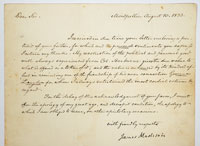 |
Madison, James (1751-1786) 4th President of the United States (1809-1817). Letter Signed, one page, 9¾ x 8 in., Montpellier, Aug. 10, 1833. To John H. Sherburne, thanking him for a portrait of his father. "…My recollection of the political and personal good will always experienced from Col. Sherburne gives the due value to what I offered as a token of it; and the value is enhanced by its kindred effect in reminding me of the friendship of his near connection Governor Langdon [New Hampshire statesman John Langdon, 1741-1819] for whom I always entertained the most cordial esteem and regard. For the delay of this acknowledgement of your favor, I must offer the apology of my great age, and decrepit condition, the apology to which I am obliged to recur, on other epistolary occasions."
John S. Sherburne (1757-1830) served as an officer during the Rvolutionary War and later became a U.S. Congressman and judge. John H. Sherburne, to whom the letter is addressed, wrote a biography of John Paul Jones. Very good; minor toning, normal folds, and two small holes in blank areas. Despite Madison's advanced age and illness, the signature is bold.
Estimated Value $1,500 - 2,000.
View details and enlarged photo
| Unsold |
Lot 355 |
 |
Obama, Barack (1961 -) 44th President of the United States (2009-). Book Signed in black marker on the title page. The Audacity of Hope (New York, Crown Publishers, 2006). Some pages with creased edges and scratch on back of dust jacket, else fine.
Estimated Value $50 - 75.
View details and enlarged photo
| Realized
$176 |
Lot 356 |
 |
Pierce, Franklin (1804-1869) 14th President of the United States (1853- 57). Autograph Letter Signed "Fr. Pierce" as U.S. Senator, 3pp, 10 x 8 in., Washington, Jan. 24, 1842. With Free Frank, "Free Frank. Pierce" at top right of holograph address panel. Pierce writes to his wife and future First Lady, Jane Pierce, about happenings in Washington and in particular, the attempt being made in the House of Representatives to censure and expel ex- President John Quincy Adams because of his insistence on presenting petitions calling for the abolition of slavery. Light toning; a one-inch fold separation and small tear in top horizontal fold, affecting three words of text; otherwise, fine.
In part: "The disorderly and disorganizing scenes in the House still continue. A resolution of censure upon J.Q. Adams was introduced this afternoon, and it is supposed that an attempt may be made in the morning to expel him. This can only be done by a vote of two thirds which cannot be obtained. The expulsion of Mr. Adams, Wise & two or three others would undoubtedly add greatly to the decorum of proceedings and facilitate the dispatch of business. Good night dearest….Tuesday Evening - Mr. Marshall of Ky introduced resolutions this morning censoring Mr. Adams for presenting a petition praying for the dissolution of the Union. Mr. A. replied and defended himself with his usual ability & violence. Wise now has the floor & is playing the mad man more perfectly than Mr. Adams himself. This scene in which the worse passions are embodied in the most offensive language will probably continue for three or four days and then the whole thing go off in smoke. Adams, Wise and perhaps a few others will have gained a little additional notoriety at the expense of the character and money of the Nation and a deeper sadness will settle upon the heart of every patriot as it must after such scenes. I inclose to you Mrs. [Daniel] Websters card just to show you how these things are done under the new dynasty…."
After his term as President (1825-29), Adams served for 17 years in the House of Representatives (1831-48), making him the only Chief Executive to return to Congress. He was a champion of the right of petition, a right which was denied by the "Gag Rule," the Pinckney Resolution, passed in 1836 by pro-slavery members of Congress, providing that all petitions relating to slavery should be rejected. Adams fought tirelessly against this "Gag Rule," arguing that it violated the First Amendment. He was threatened more than once with censure or expulsion but year after year continued to present the many petitions against slavery which he received. In 1837, he outraged pro-slavery members of Congress by presenting a petition purported to be from 22 slaves and was saved from censure only by his verbal agility. The "Gag Rule" was re-adopted each year unti 1844 when Adams made his annual motion to repeal it and the motion was carried by a vote of 108 to 80. This important event in the history of anti-slavery was the work of John Quincy Adams. When John F. Kennedy was looking for political figures of strong character to feature in this book, Profiles in Courage, J.Q. Adams was one of those he chose.
Estimated Value $9,000 - 12,000.
View details and enlarged photo
| Realized
$11,750 |
Lot 357 |
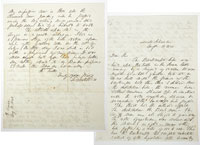 |
Pierce, Franklin. Autograph Letter Signed "Frank. Pierce" as U.S. Senator, two pages, 10 x 8 in., Senate Chamber, Aug. 18, 1841. To H.H. Carroll in Concord, N.H., reporting on proceedings in the House of Representatives regarding a bankruptcy bill. Fine except for minor wrinkling and a couple of tiny edge tears; small paper loss from seal tear on address leaf affects nothing.
In part: "The Bankrupt bill was laid upon the table in the House last evening by a majority of 12 votes….at a caucus last night the friends of the bankrupts took their stand & declared that…other measures should not be sanctioned until the vote of yesterday should be reconsidered & the bankrupt bill passed. This threat had the intended effect. The distributors - the Bank men - the Tariff men were all obliged to give way. The vote of yesterday was reconsidered this morning as agreed in caucus & the bill passed by a vote of 111 to 106. Thus have the Bankrupts the complete & absolute control of the legislation of the country. My impression now is that all the measures now pending will be passed under this logrolling arrangement….The attack upon me in the Argus is a great outrage. I had in a previous stage of the bill voted upon each of the questions taken on the 31st of July. On that day I was sick in bed with a physician by my side…."
Enacted by Congress as a result of an unsavory round of logrolling (trading votes for promises of support for pet projects), the Bankruptcy Act of 1841 (5 Stat. 440) was repealed in 1843 after being on the books for only thirteen months. It did, however, introduce several innovations, such as allowing the debtor to declare voluntary bankruptcy, that have served as cornerstones for every federal bankruptcy law that followed.
The 1841 act was the second of four federal bankruptcy laws enacted by Congress during the nineteenth century (the others were enacted in 1800, 1867, and 1898) and it followed the same general pattern. The two main forces leading to federal bankruptcy legislation were the onset of a major economic depression and political control by the conservative party (the Republicans or their predecessors, the Whigs and Federalists). The strongest support for federal bankruptcy legislation came from conservatives in the Northeast, who viewed such legislation as essential to establishing a commercial society. The most vigorous opponents were liberal lawmakers from the South and Midwest. They worried that federal bankruptcy legislation would threaten the stability of farming interests by, among other things, enabling Northern creditors to foreclose on farms during a temporary downturn.
Estimated Value $5,000 - 7,500.
View details and enlarged photo
| Unsold |
Lot 358 |
 |
Pierce, Franklin. Autograph Letter Signed "Frank. Pierce" as U.S. representative, three pages, 10 x 8 in., Washington, Jan. 20, 1834. With Free Frank, "Free F. Pierce / M.C." at top right of holograph address panel. Written to Colonel John Steele, later Governor of New Hampshire, giving insight into the political intrigues within the Congress concerning President Jackson's opposition to re-chartering the Bank of the United States, and his highly controversial order that the government remove its deposits from that banking institution. Seal tear affects a couple of words of text; text and signature of medium boldness.
In part: "…Do not believe that I could ever regard you as a Meddlesome advisor….In the Senate you know there is a clear majority against the Administration, Nationals & Nullifiers uniting on every question of any magnitude. Still my own opinion is that Clay's resolutions cannot be passed even there. Hostile as they are to the man who possessed the moral courage to resist & check the strides of that grasping monopoly the U.S. Bank. Still they will not trust their reputations upon the first resolution - they dare not go the length there proposed. The resolutions will finally be committed to the Committee on Finance and a report will be made with such resolutions as may unite all the opposition. Colo. Benton, Mr. Rives of Va. and Mr. Shepley have made able speeches in vindication of the course of the President & Sec'y Taney….the Monster is determined to die hard - putting on the screws every where for the purpose of frightening Congress into a recharter, by holding up before timid men (I hope the number is small) ruin & general distress, but all will not do - the Bank cannot survive - it cannot find life under a new charter. The debate is still going on in the House and will probably continue for three weeks to come, but the Members are manifestly weary of long speeches & those who occupy the floor herafter upon this question, must talk to be read not to be heard. Mr. Sec'y Taney will finally be sustained in the House by a majority of 20 votes at least….You will have noticed before this reaches you that the Legislatures of Ohio, North Carolina, New Jersey, & New York have all declared in favor of the removal of the deposits by large Majorities. And these resolutions are coming before Congress at a favorable moment. Virginia is acting in a singular manner. Such men as Chapman, Johnson, & Leigh &c. have too much influence there. The Old Dominion is certainly losing her high political character and of consequence her influence…."
In 1832, Jackson vetoed the re-charter of the Bank of the U.S. because he believed that Congress did not have the constitutional authority to create it and that it favored the Eastern elite to the detriment of the working people. Jackson withdrew some $11 million in federal funds in 1833, placing the funds in state-chartered banks. The state banks issued paper money freely and extended easy credit, touching off inflation and land speculation. Two months after Pierce wrote this letter, the U.S. Senate censured Jackson on March 27, 1834, for his action in removing the funds; however, three years later, when the Jacksonians had a majority in the Senate, the censure was expunged. In 1836, Jackson would try to restore economic order by issuing the Specie Circular, which required buyers of public land to pay in gold or silver. The end result would be the panic of 1837.
Estimated Value $4,000 - 5,000.
View details and enlarged photo
| Realized
$4,465 |
Lot 359 |
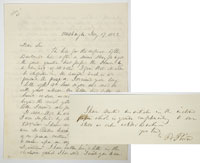 |
Pierce, Franklin. Autograph Letter Signed "Fr. Pierce" as U.S. Senator, 2¼ pages, 10 x 8 in., Washington, Jan. 17, 1842. To H.H. Carroll in Concord, N.H., reporting on proceedings in the House to repeal the bankruptcy bill which had just passed in 1841. Fine except for a couple of tiny edge creases; small paper loss from a seal tear on the address leaf affects nothing.
In part: "The bill for the repeal of the Bankrupt bill, after a severe struggle to get the final question, has passed the House by a majority of 22 votes. I fear that it will be defeated in the Senate. Such is at present the prospect….Our letters had better be burnt as soon as read….I received one from our friend Robinson. It seems that he was not at your caucus. I was surprised by what you say of Dr. Carter & Mr. Low….Robinson says 'some of our friends construe them (the resolutions) into a censure upon our representations to the last Legislature.' I have written him a letter in the conclusion of which I have said 'I wish you to consider this as between ourselves unless you may think proper to show it to Carroll or my friend Dr. Carter.' I hope he will show it to you."
T he Bankruptcy Act of 1841 was enacted by Congress as a result of an unsavory round of logrolling (trading votes for promises of support for pet projects) (5 Stat. 440). It was only on the books for thirteen months, being repealed in 1843. The bill for repeal, which Pierce reports in this letter, was defeated in the Senate.
The 1841 act was the second of four federal bankruptcy laws enacted by Congress during the nineteenth century (the others were enacted in 1800, 1867, and 1898) and it followed the same general pattern. The two main forces leading to federal bankruptcy legislation were the onset of a major economic depression and political control by the conservative party (the Republicans or their predecessors, the Whigs and Federalists). The strongest support for federal bankruptcy legislation came from conservatives in the Northeast, who viewed such legislation as essential to establishing a commercial society. The most vigorous opponents were liberal lawmakers from the South and Midwest. They worried that federal bankruptcy legislation would threaten the stability of farming interests by, among other things, enabling Northern creditors to foreclose on farms during a temporary downturn.
Estimated Value $4,000 - 6,000.
View details and enlarged photo
| Unsold |
Lot 360 |
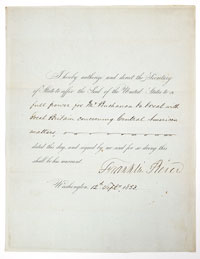 |
Pierce, Franklin. Partly-printed Document Signed "Franklin Pierce" as President, one page, 10½ x 8 in., Washington, Sept. 12, 1853. Accomplished in manuscript. Ordering the Secretary of State to affix the Seal of the United States to "a full power for Mr. Buchanan to treat with Great Britain concerning Central American matters…." A horizontal fold lightly traverses the large, bold signature., else fine.
Because of the possibility of an inter-oceanic canal across Nicaragua, both the United States and Great Britain were wary of each other's presence in Central America. Great Britain had territorial claims in Belize (or British Honduras), the Mosquito Coast, and the Bay Islands. The United States had no territorial claims, but had treaties ready for ratification with Nicaragua and Honduras. The Clayton-Bulwer Treaty was negotiated in 1850 to ensure that neither country obtained exclusive control of the proposed canal. The treaty was signed and ratified by both governments, but before the exchange of ratifications, the British made a declaration that the treaty did not apply "to Her Majesty's settlement at Honduras [Belize] or its dependencies."
The U.S. then followed with a counter declaration, and negotiations went on until a treaty was signed on Oct. 17, 1856, which supposedly removed the difficulties. It is toward the conclusion of this treaty that President Pierce gives James Buchanan the full power to treat with Great Britain and which Buchanan, as President, submitted to the Senate for ratification on Dec. 10, 1856, and ratified himself on Mar. 12, 1857. The treaty was transmitted to London for ratification by the British Government, which then insisted that the U.S. recognize a convention the British had signed with Honduras (Belize) on Aug. 27, 1856. The U.S. rejected the British clause and suggested one of its own, which the British rejected. In his First Annual Message, given on Dec. 5, 1853, Pierce states that "Embarrassing questions have also arisen between the two Governments [British and American] in regard to Central America." When James Buchanan gave his First Annual Message to Congress four years later, he referred to attempts to negotiate the same treaty, which he called "the most unfortunate of all…."
Estimated Value $1,000 - 1,250.
View details and enlarged photo
| Unsold |
Lot 361 |
 |
Polk, James K (1795-1849) 11th President of the United States (1845-48). Partly-printed Document Signed "James K. Polk" as President, one page, 10 x 8 in., Washington, May 6, 1845. Accomplished in manuscript. Ordering the Secretary of State to affix the Seal of the United States to "a full power authorizing William R. King to exchange the ratifications of an additional article to the recent convention between the U. States and France, for the surrender of criminals…." Fine.
In the late 1700s, nations began to arrange extradition treaties among themselves. Before then, people who committed crimes were able to escape punishment by fleeing to another country. Extradition treaties provided that suspected perpetrators of certain crimes be returned to the country in which the crime was committed. This document authorizes the ratification of an additional article to the original Nov. 9, 1843 Convention for the surrender of criminals between the United States and his Majesty the King of France.
In 1844, President Tyler appointed one of Alabama's first two U.S. Senators, William Rufus DeVane King (1786-1853) as minister to France (1844-46), a position which had been vacant for 18 months because of the Senate's feuding with Tyler. King's primary mission in Paris was to keep King Louis Philippe from interfering with U.S. plans to annex Texas. There was some opposition in England and it was believed that France might be persuaded to join in. King, however, received a positive reaction from the French monarch and the annexation took place without opposition from any of the European powers.
King was a Jacksonian Democrat who served in the U. S. House (1811-16) and spent nearly three decades in the U.S. Senate. In 1852, seven years after Polk signed this document, King was elected Pierce's Vice President. Terminally ill with tuberculosis, King went to Cuba to recuperate and, by a special act of Congress, took his oath of office there, the only nationally elected official to be sworn in on foreign soil. He returned to Alabama and died without ever assuming his duties. He was the only Vice President who never presided over the Senate.
Estimated Value $6,000 - 8,000.
View details and enlarged photo
| Unsold |
|
|